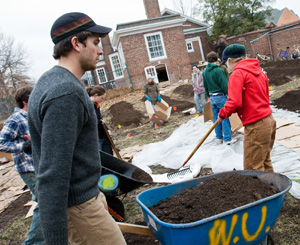 Scott Bressler
Scott BresslerAfter confusion last semester about how to implement Student Union’s Campus Enrichment Fund, several student groups have started to take advantage of the opportunities it offers.
The Campus Enrichment Fund, formerly known as the Executive Projects Fund, is meant to “empower students to make their campus initiatives a reality,” according to Student Union (SU) President Neil Patel, a senior.
The first initiative to receive funding from the Campus Enrichment fund was the Burning Kumquat, a student run organic farm that began building earlier this week.
The student run “Vote” initiative, organized by freshman Jordan Aibel and senior Matt Adler that shuttled students from the Danforth Campus to nearby polling places on Super Tuesday also received support from the fund.
Other student projects included this fall’s Student Diversity Initiative town hall meeting and the Society of Automotive Engineers’ plan to build a racecar from parts and represent the University at competitions.
Marius Johnson, Student Union Treasurer, says that he is happy with the path that the Campus Enrichment Fund has taken.
“[The Campus Enrichment Fund has] taken a pretty good direction, especially as of recently. Student Union is a source of funding for things like this. I would like to see it expanded in the future,” said Johnson.
The fund began the year with $22,000 allocated to help fund student projects that cannot get funding through the Student Group Activities Committee.
This could be because they are not yet student groups and need start up costs, like the proposed D-Bears sober driver program or the Burning Kumquat, or because the project is a one time occurrence, like the Super Tuesday “Vote” shuttles.
As long as the idea helps students and is student led, the project could potentially get funding.
“The way we view it is something that is going to benefit a lot of students or a group of students that doesn’t count as a student group,” said Johnson.
Students with ideas can e-mail their initiatives to Johnson or Patel, who review the programs and present them to the Executive Council.
Not all programs considered are candidates, however, even if the Senate passes a resolution in favor of the program, like the D-Bears pilot program, an initiative designed to help reduce instances of drinking and driving on campus.
It applied for the Campus Enrichment Fund allowances, but the cost was too high. The insurance alone would have cost $20,000, according to Johnson and in effect dry up the account. These costs have put the program at a stalemate.
Johnson, while happy with the student use of the Fund, says that he hopes that it will eventually provide funding for one new initiative a month.
“We feel that students have taken advantage of the Campus Enrichment Fund. Funding is still available. If you have any ideas, let us know,” said Patel.